Menu for 2020
Updated: December 4, 2024
Lunch on Tuesday, November 19, 2024
Fried hoki
The world cuisine for November is New Zealand. Like Japan, New Zealand is a long island nation stretching from north to south, with four seasons. As it is surrounded by the sea, it has a culture of eating seafood.
For the school lunch, we made fried hoki using a fish called hoki from New Zealand. Hoki is a type of white fish, just like cod. It has a light flavor and soft flesh, so it is often eaten fried.
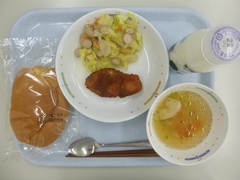
Lunch on November 19th
Lunch on Friday, November 22, 2024
Imoni
The local school lunch for November is from Yamagata Prefecture. Imoni is a hotpot dish made with taro that is often eaten in the Tohoku region from autumn to winter, when taro is harvested. Taro has been eaten in Japan for a long time.
The ingredients used in Imoni, other than taro, vary depending on the region. Also, the seasonings vary, such as miso and soy sauce. The Imoni served at school lunches uses pork and other ingredients and is seasoned with soy sauce.
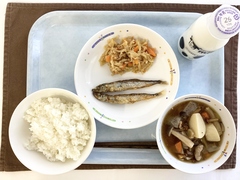
School lunch on November 22nd
Lunch on Monday, October 28, 2024
Satsuma soup
The local school lunch for October is Kagoshima Prefecture. Satsuma soup is a local dish that has been eaten in Kagoshima Prefecture since the Edo period, and "Satsuma" is the old name for Kagoshima Prefecture.
Satsuma soup is characterized by the inclusion of chicken, and is eaten when guests come over or on special occasions.
The school lunch Satsuma soup also contains sweet potatoes, which are harvested in abundance in Kagoshima Prefecture. The name "satsuma potato" comes from "Satsuma," the old name for Kagoshima Prefecture.
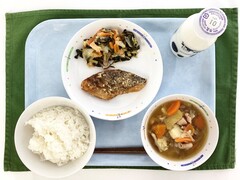
Lunch on October 28th
Lunch on Tuesday, October 29, 2024
Gapao rice
The world cuisine for October is Thai. Thailand is located in Southeast Asia and is officially called the Kingdom of Thailand.
The word "gapao" in "gapao rice" means the herb "basil" in Thai.
In addition to various herbs, Thai cuisine often uses a seasoning called "nam pla." Nam pla is a seasoning made by fermenting fish, and is characterized by its unique aroma and strong umami flavor.
The gapao rice served in school lunches was also seasoned with fish sauce.
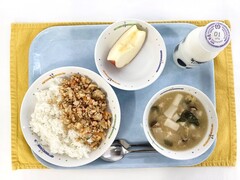
Lunch on October 29th
School lunch on Thursday, September 12, 2024
Sauce cutlet
Sauce katsudon is a local delicacy from Fukui Prefecture, consisting of crispy deep-fried pork cutlet coated in sauce and served on rice.
The standard katsudon is a pork cutlet bound with egg and served over rice, but in Fukui Prefecture, this sauce katsudon is the more common type of katsudon.
The sauce for sauce cutlet is made with ketchup or Worcestershire sauce as a base, with sugar and mirin added for sweetness and richness. This rich sauce brings out the umami of the cutlet.
For school lunch, we made chicken cutlets and poured sauce over them.
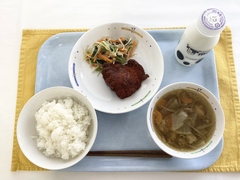
School lunch on September 12th
School lunch on Wednesday, September 4, 2024
Pitti Panna
September's World Cuisine is Swedish.
Sweden is located in Northern Europe and is a country rich in nature, with about half of the country covered in forests.
"Pittipanna" is a Swedish home-cooked dish that means "little things in a frying pan" in Swedish. It is made by frying finely chopped potatoes, onions, sausages, etc.
Potatoes are a staple food in Sweden and an essential ingredient in traditional Swedish cuisine. It is said that Pittipanna originated when people had a surplus of potatoes.
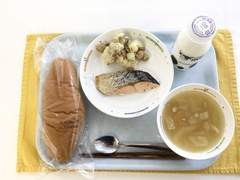
School lunch on September 4th
Lunch on Tuesday, July 16, 2024
Mozuku seaweed soup
The local school lunch for July is Okinawa Prefecture.
The mozuku used in mozuku soup is a type of seaweed, the same as wakame and hijiki. In Okinawa Prefecture, which produces the most mozuku in Japan, it is sometimes fried and eaten.
For today's school lunch, we added mozuku seaweed to a chicken stock soup, allowing the students to enjoy its smooth texture and chewy texture.
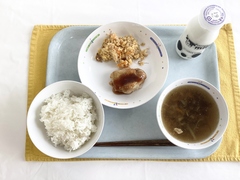
Lunch on July 16th
Lunch on Wednesday, July 10, 2024
minestrone
The world cuisine for July is Italian. Italy is a country in southern Europe, shaped like a boot jutting out into the Mediterranean Sea. Just like Japan, it has four seasons.
Speaking of Italian cuisine, there are many dishes that use tomatoes. Italian tomatoes are best suited for stews because they become more delicious when heated. Also, most of them tend to be longer and thinner than Japanese tomatoes.
For lunch, we enjoyed "minestrone," a home-style Italian dish. "Minestrone" means "soup with lots of ingredients," and it was made by simmering a lot of vegetables.
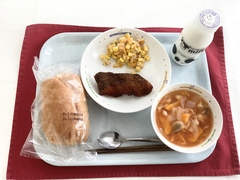
School lunch on July 10
School lunch on Thursday, June 27, 2024
Dakgalbi rice bowl
The world cuisine for June is Korea, a country close to Japan.
Dakgalbi is a Korean barbecue dish, where "dak" means chicken and "galbi" means ribs. It is a dish made by stir-frying chicken, cabbage, onions and other vegetables with Korean miso and gochujang. "Cheese Dakgalbi," topped with cheese, is also famous.
For school lunch, we had it served over rice as "Dak Galbi Rice Bowl."
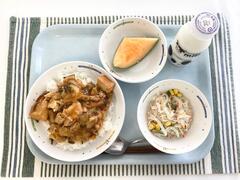
School lunch on June 27th
School lunch on Thursday, June 13, 2024
Pulling back
This month's local school lunch is Fukushima Prefecture.
Hikinari is one of the local dishes eaten in Fukushima Prefecture. "Hikina" means shredded vegetables such as daikon radish in the Fukushima dialect, and the dish made by frying "hikina" is called "hikinari." It is said to be made from vegetables that have been shredded and preserved for the winter, and has been a popular home-cooked dish since ancient times.
The ingredients and seasonings used vary from household to household, but for school lunches, in addition to radish, chicken, chikuwa (fish cake), carrots, and green peppers are used, and the food is seasoned sweet and spicy with sugar and soy sauce.
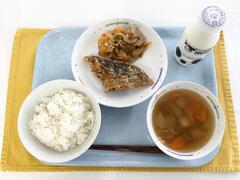
School lunch on June 13th
Lunch on Wednesday, May 29, 2024
wiener tomato sauce
The World Cuisine of May is Argentina.
Argentina is a country located in the southeastern part of the South American continent. Blessed with abundant nature such as jungles and grasslands, agriculture and livestock farming have become thriving industries. The country has a food culture that is particularly meat-heavy, and its per capita meat consumption is among the highest in the world.
Choripan is a dish of thick sausage called chorizo sandwiched between bread. It can also be eaten with a sauce made from vinegar and spices called chimichurri. For this dish, we've sandwiched sausage coated in tomato sauce between bread rolls, creating a choripan-style dish.
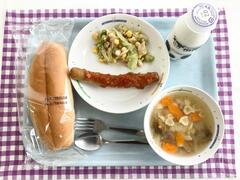
Lunch on May 29th -1

Lunch on May 29th -2
Lunch on Monday, May 27, 2024
Spanish mackerel with miso sauce
The local school lunch for May is Kyoto Prefecture.
Miso is a fermented food made by adding salt and koji to grains such as soybeans, rice, and wheat, and is one of Japan's traditional seasonings. It is made all over Japan, and each region has its own unique ingredients, flavor, and color, making it a food with strong regional characteristics. Saikyo miso was born in Kyoto during the Edo period and is still made there today. It is a type of white miso that is characterized by its light color and sweet taste. The name "Saikyo miso" comes from the fact that Edo was renamed "Tokyo" during the Meiji Restoration, and Kyoto, the capital of the west, came to be called "Saikyo."
For today's school lunch, we made a sauce using Saikyo miso and poured it over grilled Spanish mackerel.
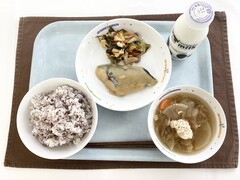
School lunch on May 27th
Lunch on Tuesday, April 30, 2024
Asuka soup made with soy milk
The local school lunch for April is Nara Prefecture.
Asukajiru is a miso soup made with milk, chicken, and seasonal vegetables, and is a traditional dish of Nara Prefecture. It is said that milk and chicken dishes were introduced from the Tang Dynasty, an old Chinese dynasty, during the Asuka period and were eaten by aristocrats.
Today's Asukajiru soup was made with soy milk instead of milk. Both the soy milk and the miso used for seasoning are made from soybeans, so they go well together and create a mellow flavor.

Lunch on April 30th
Lunch on Friday, April 19, 2024
scotch broth
This month's World Cuisine is British.
Scotch broth is a famous dish in Scotland, England, and is a hearty soup made by simmering meat, vegetables, barley, etc. In Scotland, lamb or beef is often used, but the school lunch version was made with pork.
The barley used in the soup is called "oshimugi," which is steamed barley that has been crushed and dried. It is rich in dietary fiber, which improves stomach conditions, and has a fun, crunchy texture.
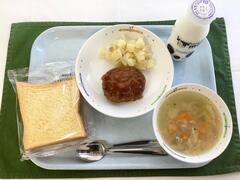
Lunch on April 19th
Inquiries regarding this page
Inagi City Education Department School Lunch Division
3648 Yanoguchi, Inagi City, Tokyo
Telephone: 042-377-8904 Fax: 042-379-1501







